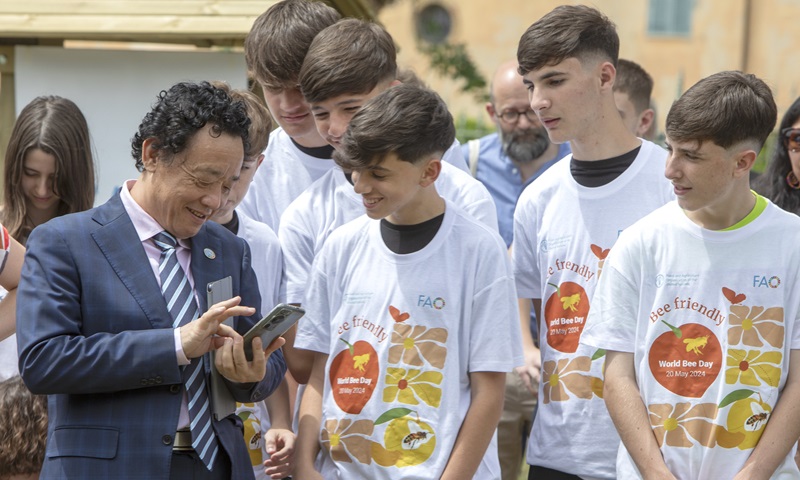On World Bee Day 2024, experts called on young people to learn about the vital role of bees and pollinators as well as the traditional and high-tech beekeeping to safeguard the vital role these small creatures play in agriculture, ecological balance, and biodiversity preservation.
This initiative was highlighted during the World Bee Day 2024 celebration at the Italian Presidential Estate in Castel Porziano, Rome, by Food and Agriculture Organization (FAO), the Government of Italy, and APIMONDIA, the International Federation of Beekeepers’ Association.
FAO Director-General QU Dongyu emphasized the importance of educating the new generation about bees and pollinators, including both traditional and high-tech beekeeping methods. This knowledge is crucial for safeguarding the essential functions that these small creatures perform in maintaining ecological balance and biodiversity.
FAO Director-General Qu highlighted that producers should adopt pollinator-friendly agricultural practices, beekeepers should use sustainable local bees and plants, governments should implement harmonious policies, and consumers should be informed about the origins of their food.

Italy’s Minister of Agriculture, Francesco Lollobrigida, emphasized the need for young farmers and beekeepers to innovate and address current challenges.
“Young people, the protagonists of World Bee Day 2024, can make a key contribution through increased awareness of the importance of bees that can turn into entrepreneurial engagement as beekeepers. We need young farmers and beekeepers who can address the many current challenges and who can contribute to innovation in the production chain,” said Francesco Lollobrigida, Italy’s Minister of Agriculture, Food Sovereignty and Forestry, in the speech read on his behalf by Stefania Costanza, Deputy Permanent Representative of the United Nations in Rome.
Jeff Pettis, President of Apimondia, underscored the necessity of protecting bees to maintain biodiversity and combat climate change. “Pollination is critical to our diets,” Jeff said in his remarks during the ceremony, “If we really want to protect 30 percent of our planet by 2030, we need to act on the importance of protecting bees to preserve biodiversity and combat climate change.”
During the ceremony, FAO and Apimondia extended their long-standing collaboration, signing a new Memorandum of Understanding to promote sustainable beekeeping.
Bee engaged with Youth
At the event, educational panels were inaugurated along the path leading to a bee study center within the estate. Educational panels, equipped with QR codes for translations, highlight how pollinators ensure plant survival, forest regeneration, and climate change adaptation.
The theme, “Bee Engaged with Youth,” brought together a group of young students to learn about the significance of pollinators. This theme highlights the importance of involving young people in beekeeping and pollinator conservation efforts, recognizing them as the future stewards of our environment.
Bees and other pollinators are critical to life on Earth, aiding in the pollination of about 75% of the world’s crops. This enhances food quantity, quality, and diversity.
Experts from the Istituto Zooprofilattico Sperimentale del Lazio e della Toscana shared their knowledge with the young audience, reinforcing the message that beekeeping is more than just honey production. It can drive innovation and address challenges like extreme weather, pesticide use, and pest spread.
Key Facts about Bees
World Bee Day, established by the UN in 2017, promotes actions to protect pollinators and their habitats. Beekeeping, practiced with minimal resources, provides income for impoverished communities, contributing to the Sustainable Development Goals (SDGs).
- Bees and other pollinators are essential for our existence, sustaining agriculture and biodiversity worldwide.
- Almost 90% of wild plants and 75% of leading global crops depend on animal pollination.
- There are over 20,000 species of bees and various other wild pollinators, but they face challenges from human activities, such as habitat loss, pesticide use, and climate change.